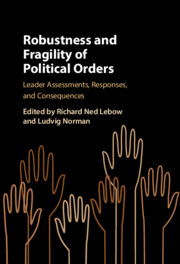Book contents
- Robustness and Fragility of Political Orders
- Robustness and Fragility of Political Orders
- Copyright page
- Contents
- Figures
- Contributors
- 1 Introduction
- 2 Robustness and Fragility of Political Orders
- 3 End of Democracy or Recurrent Conflict: Minimalist Democracy, Legitimacy Crisis, and Political Equality
- 4 Politics and the Administrative State
- 5 Roots in Common: The Fragility–Robustness of Democratic and Ecological Regimes
- 6 The End of Communist Rule in Europe: A Comparative Perspective on the Fragility and Robustness of Regimes
- 7 Democracy’s Fragility and the European Political Order
- 8 The American Fragility–Robustness Nexus
- 9 The Perils of Choice: Structure and Agency in EU Crisis Management
- 10 Conclusions
- Index
5 - Roots in Common: The Fragility–Robustness of Democratic and Ecological Regimes
Published online by Cambridge University Press: 25 November 2022
- Robustness and Fragility of Political Orders
- Robustness and Fragility of Political Orders
- Copyright page
- Contents
- Figures
- Contributors
- 1 Introduction
- 2 Robustness and Fragility of Political Orders
- 3 End of Democracy or Recurrent Conflict: Minimalist Democracy, Legitimacy Crisis, and Political Equality
- 4 Politics and the Administrative State
- 5 Roots in Common: The Fragility–Robustness of Democratic and Ecological Regimes
- 6 The End of Communist Rule in Europe: A Comparative Perspective on the Fragility and Robustness of Regimes
- 7 Democracy’s Fragility and the European Political Order
- 8 The American Fragility–Robustness Nexus
- 9 The Perils of Choice: Structure and Agency in EU Crisis Management
- 10 Conclusions
- Index
Summary
The failure of democratic regimes to identify and confront the climate crisis is the outcome of the protracted yet incomplete defeat of critical reflexivity by instrumental reasoning. Historically, this is evident in the institutional and practical consequences of colonialism, militarism, and commodification. Political elites’ objectification of nature, of uncertainty, and of oppressed groups delimits normative scope of the climate crisis. By ignoring salient differences between the epistemic and ontological limits of these acts of objectification, elites place misguided faith in their capacity to control nature, exploit others, and convert uncertainty into risk. Lawrence first historicizes the inadequacies of collective responses to the climate crisis, then encapsulates salient differences between mainstream and critical approaches to this question. He subsequently details how a dependence upon militarism and GDP correlates with quantifying uncertainty and objectifying risk, while underplaying the ecological risks of both. He concludes by reflecting upon how strategies for seeing and knowing both democratic and ecological fragility and robustness can mutually inform each other.
Keywords
- Type
- Chapter
- Information
- Robustness and Fragility of Political OrdersLeader Assessments, Responses, and Consequences, pp. 115 - 140Publisher: Cambridge University PressPrint publication year: 2022



